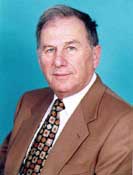
Amnon Rubinstein, a journalist and lawyer, was born in Tel Aviv in 1931. He studied economics, international relations, and law at the Hebrew University in Jerusalem, became a member of the Israel Bar in 1963, and received a Ph.D. in law from the London School of Economics in 1966.
Following his return to Israel, Prof. Rubinstein served as a professor of law at Tel Aviv University (1961-75) and Dean of the Law Faculty (1968-73). He also joined the Ha’aretz daily newspaper as a regular writer on social, economic, and legal matters. After the Yom Kippur War, he felt that he could not rest only on his academic and journalistic laurels, and decided to enter the world of Israeli politics to help change the system of government. In 1974, Rubinstein founded Shinui (The Center Party), which advocated free enterprise, electoral reform, and the formulation of a written constitution.
In the 1977 elections to the 9th Knesset, Shinui was part of the Democratic Movement for Change but became an independent Knesset party in 1978, chaired by Rubinstein ever since. In 1992, Shinui joined with Mapam (United Workers' Party) and CRM (Civil Rights Movement) to form Meretz, which won 12 seats in the Knesset.
During his 25 years of serving in the Knesset, Prof. Rubinstein held a variety of positions, including memberships in the Knesset committees on security and foreign relations, finance, economics, and law. In addition, he served as the chairman of the Knesset’s ethics, economics, legal, and comptroller’s committees. He initiated and legislated the only two basic laws that guarantee human rights in Israel. During his term as education minister, he put into practice the principles of equality and fair government, which he had championed in his lectures and legal writings. Recently, as the chairperson of the subcommittee on minorities of the Education Ministry’s National Task Force for the Advancement of Education in Israel (the Dovrat Commission), he wrote a chapter on opening a new page in relations with Israel’s Arab minority. He proposed that building the public education system in the Arab sector upon the values of equality and cooperation will help close gaps between it and the Jewish population.
In recent years, he published a number of articles and books opposing the post-Zionist trend and emphasizing the humanistic and liberal foundations of Zionism. In the face of conflicting claims regarding universal values, on the one hand, and national religious values, on the other hand, Prof. Rubinstein offered a modern, democratic alternative that would allow Israel to preserve its cultural and national distinctiveness while providing full equality to the Arab minority and maintaining its status as a democratic state. The book Israel and the Family of Nations, which Prof. Rubinstein wrote with Dr. Alex Jacobson, methodically analyzes the conceptual and legal foundations for Israel to be both a Jewish and a democratic state. The book’s historical, legal, and philosophical arguments reinforce Israel’s standing in the international legal and political community.
Prof. Rubinstein is renowned for his international activities and is well-known abroad. He has served as a board member and vice president of Liberal International and as a member of the Israeli delegation to the Council of Europe and has represented Israel on its legal committee, the Venice Commission. His books have been published in numerous languages, including English, German, French, and Russian, and his legal and other articles have appeared in the New York Times, the Washington Post, and le adi ng legal journals in Europe and America. He has received honorary degrees from a number of universities and colleges in Israel and abroad.
When Prof. Rubinstein retired from the Knesset, his farewell speech was met with applause from representatives of all the parties, a rare event that demonstrates the high regard for his accomplishments. He then went on to serve as the dean of the Radzyner School of Law of the Interdisciplinary Center and the IDC Herzliya provost. He is now president of the university.
In 2006, Rubinstein was awarded the Israel Prize. The panel of judges described Prof. Rubinstein as the “father of constitutional law in Israel ,” noting that his book Constitutional Law of the State of Israel is the primary text on the topic. “In both his profound academic writings and his diverse public activities, he advances the values of democracy, equality and human rights,” the judges wrote. “In the legal and public arena in Israel , there are few who can equal Prof. Amnon Rubinstein’s contribution to the State of Israel, as a public figure, a member of the legislative and executive branches of government, and as a brilliant researcher and legal expert.”
Rubinstein died on January 18, 2024, at the age of 92.
Sources: Israeli Ministry of Foreign Affairs.
IDC Herzliya press release.
Photo used with permission of the Knesset.



